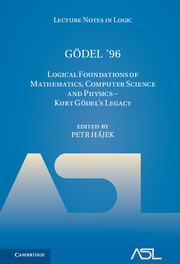Book contents
- Frontmatter
- Contents
- Preface
- Part I Invited Papers
- Gödel's program for new axioms: Why, where, how and what?
- Infinite-valued G?del Logics with 0-1-Projections and Relativizations
- Contributions of K. Gödel to Relativity and Cosmology
- Kurt Gödel and the constructive Mathematics of A.A. Markov
- Hao Wang as Philosopher
- A bottom-up approach to foundations of mathematics
- K-graph Machines: generalizing Turing's machines and arguments
- Forcing on Bounded Arithmetic
- Uniform Interpolation and Layered Bisimulation
- Part II Contributed Papers
- References
Gödel's program for new axioms: Why, where, how and what?
from Part I - Invited Papers
Published online by Cambridge University Press: 23 March 2017
- Frontmatter
- Contents
- Preface
- Part I Invited Papers
- Gödel's program for new axioms: Why, where, how and what?
- Infinite-valued G?del Logics with 0-1-Projections and Relativizations
- Contributions of K. Gödel to Relativity and Cosmology
- Kurt Gödel and the constructive Mathematics of A.A. Markov
- Hao Wang as Philosopher
- A bottom-up approach to foundations of mathematics
- K-graph Machines: generalizing Turing's machines and arguments
- Forcing on Bounded Arithmetic
- Uniform Interpolation and Layered Bisimulation
- Part II Contributed Papers
- References
Summary
Summary. From 1931 until late in his life (at least 1970) Gödel called for the pursuit of new axioms for mathematics to settle both undecided number-theoretical propositions (of the form obtained in his incompleteness results) and undecided set-theoretical propositions (in particular CH). As to the nature of these, Gödel made a variety of suggestions, but most frequently he emphasized the route of introducing ever higher axioms of infinity. In particular, he speculated (in his 1946 Princeton remarks) that there might be a uniform (though non-decidable) rationale for the choice of the latter. Despite the intense exploration of the “higher infinite” in the last 30-odd years, no single rationale of that character has emerged. Moreover, CH still remains undecided by such axioms, though they have been demonstrated to have many other interesting set-theoretical consequences.
In this paper, I present a new very general notion of the “unfolding” closure of schematically axiomatized formal systems S which provides a uniform systematic means of expanding in an essential way both the language and axioms (and hence theorems) of such systems S. Reporting joint work with T. Strahm, a characterization is given in more familiar terms in the case that S is a basic system of non-finitist arithmetic. When reflective closure is applied to suitable systems of set theory, one is able to derive cardinal axioms as theorems. It is an open question how these may be characterized in terms of current notions in that subject.
Why new axioms?
Gödel's published statements over the years (from 1931 to 1972) pointing to the need for new axioms to settle both undecided number-theoretic and set-theoretic propositions are rather well known. They are most easily cited by reference to the first two volumes of the edition of his Collected Works. A number of less familiar statements of a similar character from his unpublished essays and lectures are now available in the third volume of that edition.
Given the ready accessibility of these sources, there is no need for extensive quotation, though several representative passages are singled out below for special attention.
- Type
- Chapter
- Information
- Gödel '96Logical Foundations of Mathematics, Computer Science and Physics - Kurt Gödel's Legacy, pp. 3 - 22Publisher: Cambridge University PressPrint publication year: 2017
References
- 1
- Cited by



